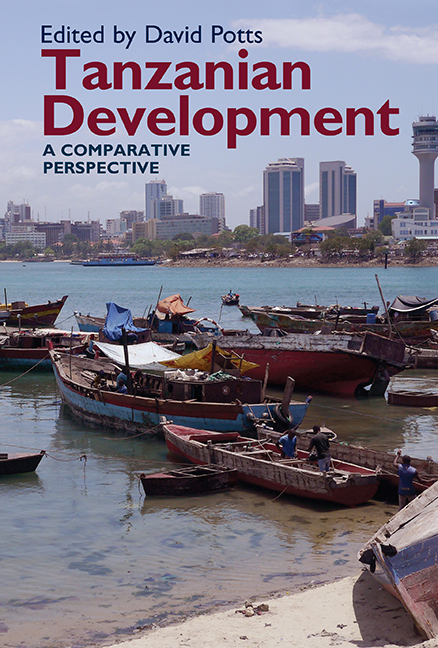Book contents
- Frontmatter
- Contents
- List of Illustrations
- Contributors
- Acknowledgements
- 1 Introduction – Tanzanian Development: A Comparative Perspective
- 2 The Political Economy of Tanzania 1967–2017: Reimagining the State
- 3 Reflections on the Tanzanian Trajectory: Decline and Recovery
- 4 Agricultural Development in Tanzania
- 5 Assets and Poverty Dynamics: The Methodological Challenges of Constructing Longitudinal Surveys in Tanzania
- 6 Contract Farming in Tanzania: Experiences from Tobacco and Sunflower
- 7 ‘We Just Sell Water – That is All We Do’: Two Cases of Small-scale Irrigation in Tanzania
- 8 The Industrial Development of Tanzania in Comparative African Perspective
- 9 Competitiveness in African Manufacturing: Some Evidence from Tanzania
- 10 ‘Good Life Never Comes Like Dreams’: Youth, Poverty and Employment in Arusha
- 11 International Aid to Tanzania – with some comparisons from Ghana and Uganda
- 12 Real Exchange Rate Changes and Export Performance in Tanzania and Ethiopia
- 13 Economic Leakage as a Constraint on Tourism's Effective Contribution to Local Economic Development in Tanzania
- 14 Extractive Industry Revenues and their Expenditure in Local Government Authorities: The Case of the Gold Service Levy in Geita District Council in Tanzania
- 15 Conclusion
- References
- Index
14 - Extractive Industry Revenues and their Expenditure in Local Government Authorities: The Case of the Gold Service Levy in Geita District Council in Tanzania
Published online by Cambridge University Press: 24 October 2019
- Frontmatter
- Contents
- List of Illustrations
- Contributors
- Acknowledgements
- 1 Introduction – Tanzanian Development: A Comparative Perspective
- 2 The Political Economy of Tanzania 1967–2017: Reimagining the State
- 3 Reflections on the Tanzanian Trajectory: Decline and Recovery
- 4 Agricultural Development in Tanzania
- 5 Assets and Poverty Dynamics: The Methodological Challenges of Constructing Longitudinal Surveys in Tanzania
- 6 Contract Farming in Tanzania: Experiences from Tobacco and Sunflower
- 7 ‘We Just Sell Water – That is All We Do’: Two Cases of Small-scale Irrigation in Tanzania
- 8 The Industrial Development of Tanzania in Comparative African Perspective
- 9 Competitiveness in African Manufacturing: Some Evidence from Tanzania
- 10 ‘Good Life Never Comes Like Dreams’: Youth, Poverty and Employment in Arusha
- 11 International Aid to Tanzania – with some comparisons from Ghana and Uganda
- 12 Real Exchange Rate Changes and Export Performance in Tanzania and Ethiopia
- 13 Economic Leakage as a Constraint on Tourism's Effective Contribution to Local Economic Development in Tanzania
- 14 Extractive Industry Revenues and their Expenditure in Local Government Authorities: The Case of the Gold Service Levy in Geita District Council in Tanzania
- 15 Conclusion
- References
- Index
Summary
Introduction
Mineral revenues have become increasingly important in Tanzania but questions have been asked about the extent to which they contribute to the development of the areas in which the minerals are located and to the wider economy. This chapter reviews some of the issues relating to the contribution of mineral wealth to the Tanzanian economy by investigating the case of the gold service levy in Geita District and its impact on the local community.
Local Government Authorities (LGAs) in Tanzania play a critical role in delivering governance and social and economic services directly to the people. Such services include infrastructure of all kinds, education, health, water, security and sanitation. According to the Local Government Act No. 9 of 1982 and the Policy on Local Government Reform of 1998, LGAs are supposed to identify and improve local revenue mobilization and to identify potential areas for investment to promote sustainable economic and social development activities in their respective jurisdictions.
Resource-rich LGAs usually expect local economies to benefit from the extraction of resources including oil, gas and mineral investments. Unfortunately, this has not always been the case. These LGAs have either been denied the fiscal space to collect revenues or do not always know how to take advantage of extractive activities to enhance sustainable economic development. Local investments in natural resources such as minerals and gas should in principle provide opportunities for LGAs to strengthen their revenues and to use the same for provision of public goods and services. It is in the context of the above that this chapter was prepared, partly based on a study by Ngowi (2015).
Minerals and Development
Mineral wealth has been viewed as a mixed blessing in relation to development. While the income and foreign exchange generated contributes to the national balance of payments as well as to government revenue and to employment, the extent of positive impact depends critically on who gets the revenue and how it is used to strengthen both the local and national economy. Very often the mineral extraction process is managed by a large foreign company, and the share of the benefits that remains in the country depends on the agreements made. There is significant potential for corruption that may affect both the share that remains within the country and the share of the remainder that accrues to the local population.
- Type
- Chapter
- Information
- Tanzanian DevelopmentA Comparative Perspective, pp. 273 - 288Publisher: Boydell & BrewerPrint publication year: 2019

